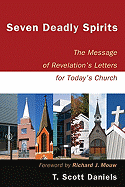
In 'Seven Deadly Spirits', T. Scott Daniels contends that corporate bodies like churches form an individual spiritual personality of sorts, incarnating an angelic spirit that is the essence of a congregation.
Cultural influences can impact the collective spirit or attitude of a congregation, either hindering it from becoming all God intends it to be or setting it free to glorify God.
Building on the work of Hendrikus Berkhof, Walter Wink, and Nancey Murphy, this engaging study provides a lens through which to understand the nature and function of the seven 'angels' of the churches addressed in the book of Revelation. These seven angels, or deadly spirits, represent key areas of struggle that were destructive in the early church and continue to damage contemporary congregations. Seven Deadly Spirits renarrates into a contemporary context the seven angels that hinder the church, providing a rich category for analysis through which to discern the influences that can affect congregations. The book encourages professors and students in pastoral ministry, theology, and church growth courses as well as working pastors and lay leaders to consider a systems approach to church leadership--one that takes seriously the 'powers' at work within local congregations - and offers suggestions for transformation.
Cultural influences can impact the collective spirit or attitude of a congregation, either hindering it from becoming all God intends it to be or setting it free to glorify God.
Building on the work of Hendrikus Berkhof, Walter Wink, and Nancey Murphy, this engaging study provides a lens through which to understand the nature and function of the seven 'angels' of the churches addressed in the book of Revelation. These seven angels, or deadly spirits, represent key areas of struggle that were destructive in the early church and continue to damage contemporary congregations. Seven Deadly Spirits renarrates into a contemporary context the seven angels that hinder the church, providing a rich category for analysis through which to discern the influences that can affect congregations. The book encourages professors and students in pastoral ministry, theology, and church growth courses as well as working pastors and lay leaders to consider a systems approach to church leadership--one that takes seriously the 'powers' at work within local congregations - and offers suggestions for transformation.



